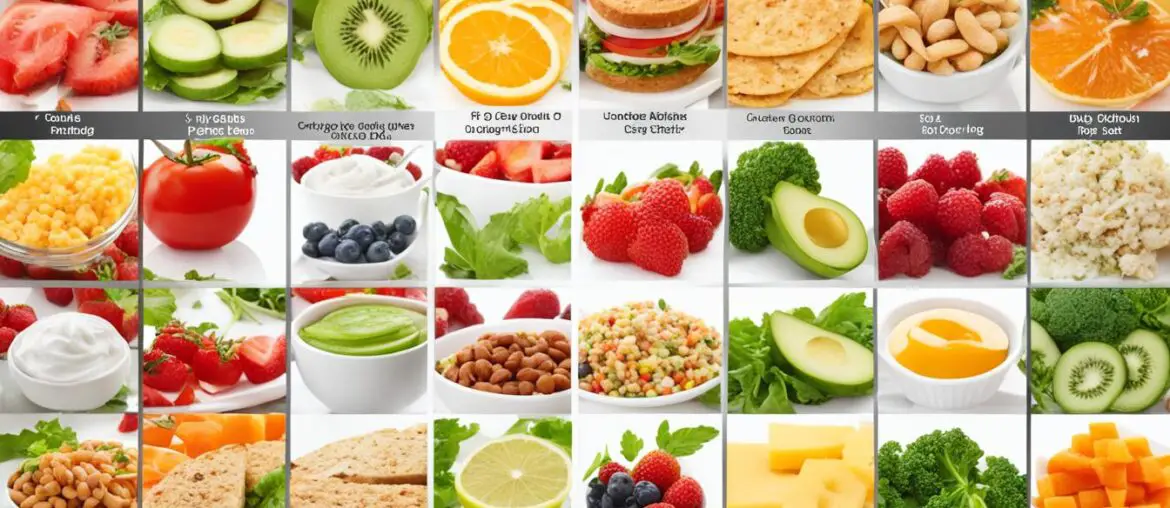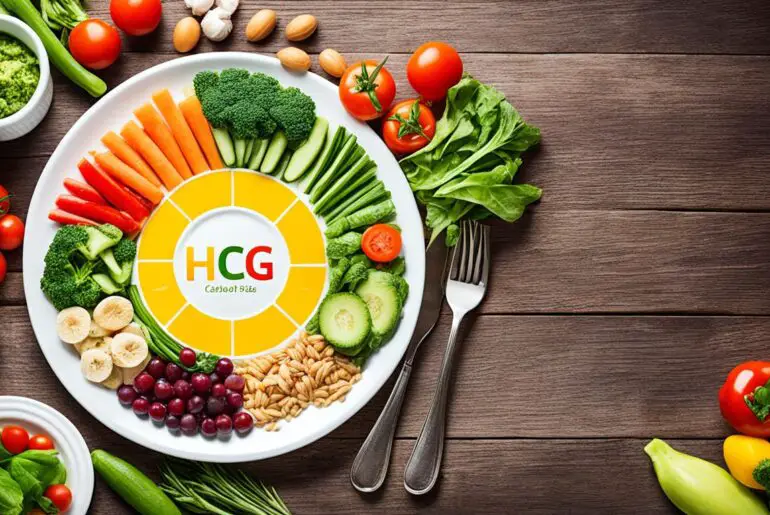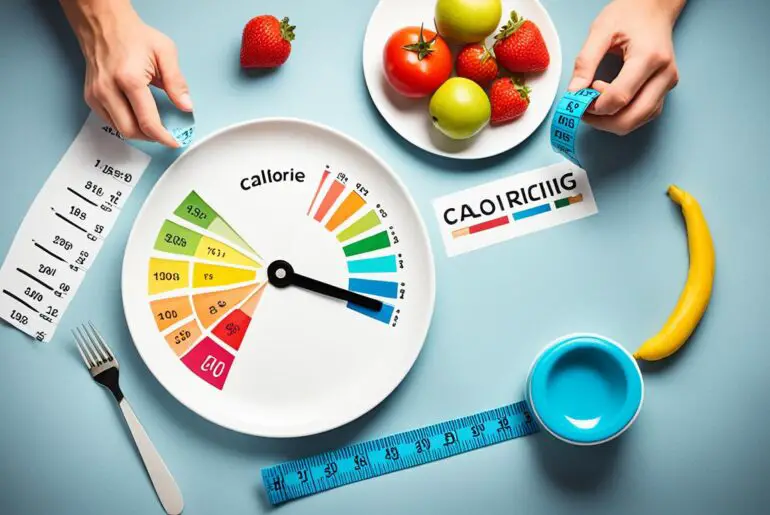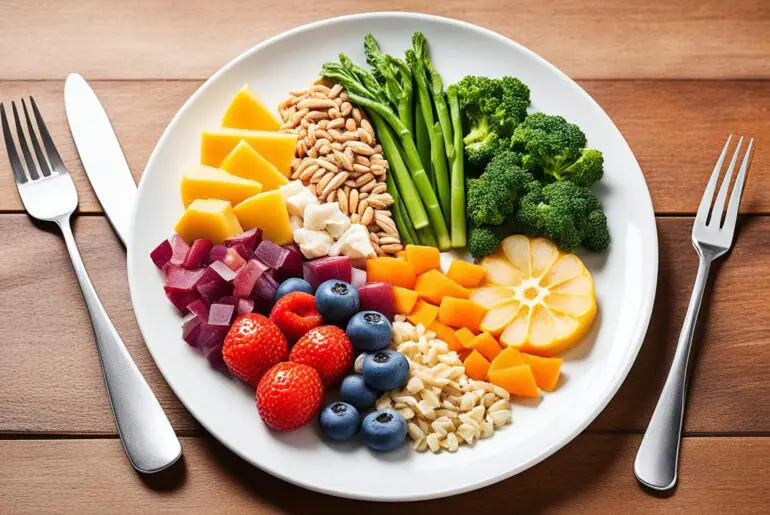Are you tired of trying countless diets without seeing the results you desire? Have you heard about the HCG Diet and wondered if it could be the solution to your weight loss struggles? But wait, here’s the burning question: can you really lose weight on just 500 calories a day?
The HCG Diet has gained popularity for its promise of rapid weight loss, but it has also sparked controversy among health experts. This weight loss protocol combines the use of HCG hormone supplements or injections with a very low-calorie diet. During the fat burn phase, participants are restricted to a mere 500 calories per day and have to follow specific guidelines for food choices. But does this extreme calorie limitation really deliver the weight loss results it claims?
Before you jump into the HCG Diet bandwagon, it’s essential to understand its ins and outs, its history, controversies, and most importantly, its safety and effectiveness. In this comprehensive guide, we will delve into the different phases of the HCG Diet, the recommended food choices, the potential risks and side effects, and even explore safer alternatives that can help you achieve your weight loss goals without compromising your health.
Key Takeaways:
- The HCG Diet combines the use of HCG hormone supplements or injections with a very low-calorie diet.
- The diet is divided into three phases: the start, fat burn, and maintenance phases.
- The fat burn phase restricts participants to consuming only 500 calories per day.
- The HCG Diet promises rapid weight loss but is highly debated among health experts.
- There are safe and effective alternatives to the HCG Diet that focus on balanced and sustainable meal plans.
The HCG Diet: History and Controversy
The HCG Diet has a fascinating history that dates back to the 1950s when it was developed by British physician Dr. Albert Simeons. Dr. Simeons believed that the use of the HCG hormone combined with a very low-calorie diet could lead to rapid weight loss without hunger or muscle loss.
However, despite its popularity, there is a lack of scientific evidence to support the claims made about the HCG Diet. The FDA does not approve the use of HCG for weight loss, and many health experts consider the diet to be both unsafe and ineffective.
While proponents of the HCG Diet argue that it can lead to quick and dramatic weight loss, critics point out that this weight loss is likely due to the extreme calorie restriction rather than the HCG hormone itself. The diet’s effectiveness beyond short-term weight loss is questionable, and there are concerns about the potential for regaining weight once the diet is discontinued.
Additionally, the safety of the HCG Diet has been a subject of controversy. The severe calorie restriction can result in nutrient deficiencies and may have adverse effects on overall health and well-being. The diet’s restrictive nature and potential side effects, such as fatigue and irritability, raise further concerns about its safety.
Ultimately, it is important to approach the HCG Diet with caution and skepticism. Consulting with a healthcare professional or registered dietitian is highly recommended before considering any weight loss program, especially one as controversial as the HCG Diet.
“The HCG Diet gained popularity for its claims of rapid weight loss without hunger or muscle loss, but there is a lack of scientific evidence to support these claims.”
| Pros | Cons |
|---|---|
| May lead to rapid weight loss | Lack of scientific evidence |
| May reduce hunger | FDA does not approve the use of HCG for weight loss |
| Considered unsafe and ineffective by many health experts | |
| Severe calorie restriction can result in nutrient deficiencies | |
| Potential side effects like fatigue and irritability |
HCG Diet Phases: A Closer Look
The HCG Diet is divided into three distinct phases, each with its own set of guidelines and goals. These phases include the start phase, the fat burn phase, and the maintenance phase. Let’s take a closer look at each phase:
1. Start Phase
During the start phase of the HCG Diet, participants are encouraged to load up on high-fat and high-calorie foods. This phase typically lasts for two days and serves as a preparation period for the subsequent phases. Participants also begin taking HCG supplements during this phase to kick-start their weight loss journey.
2. Fat Burn Phase
The fat burn phase is the most crucial and challenging part of the HCG Diet. It involves consuming a strict daily calorie limit of only 500 calories. This phase typically lasts for three to six weeks, depending on individual goals and progress.
Participants are required to follow a specific list of allowed foods during the fat burn phase. These include lean proteins, certain low-carbohydrate vegetables, limited fruits, and specific seasonings. It is essential to adhere to these guidelines to maximize the effectiveness of the HCG hormone and promote fat burning.
Let’s take a closer look at what foods are allowed during the fat burn phase:
| Allowed Foods | Restricted Foods |
|---|---|
| Lean sources of protein such as chicken, turkey, and fish | Sugary desserts and sweets |
| Specific low-carbohydrate vegetables like spinach, lettuce, and cucumbers | Dairy products including milk, cheese, and yogurt |
| Limited fruits such as apples, oranges, and strawberries | Grains and starches including bread, rice, and pasta |
3. Maintenance Phase
The maintenance phase allows participants to gradually increase their calorie intake while still avoiding sugar and starch. This phase typically lasts for three weeks and focuses on stabilizing weight loss and establishing healthier eating habits.
During the maintenance phase, participants can slowly reintroduce additional foods into their diet while closely monitoring their weight and the impact of these foods. The goal is to find a balance that enables individuals to maintain their weight loss results over the long term.
Now that we have explored each phase of the HCG Diet, let’s delve deeper into the food choices within these phases and what foods to eat and avoid.
“The HCG Diet consists of three distinct phases: the start phase, fat burn phase, and maintenance phase. Each phase plays a vital role in achieving weight loss goals. By understanding the guidelines and making informed food choices, individuals can optimize their results and develop healthier eating habits for sustainable weight management.”
HCG Diet Food Choices: What to Eat and What to Avoid
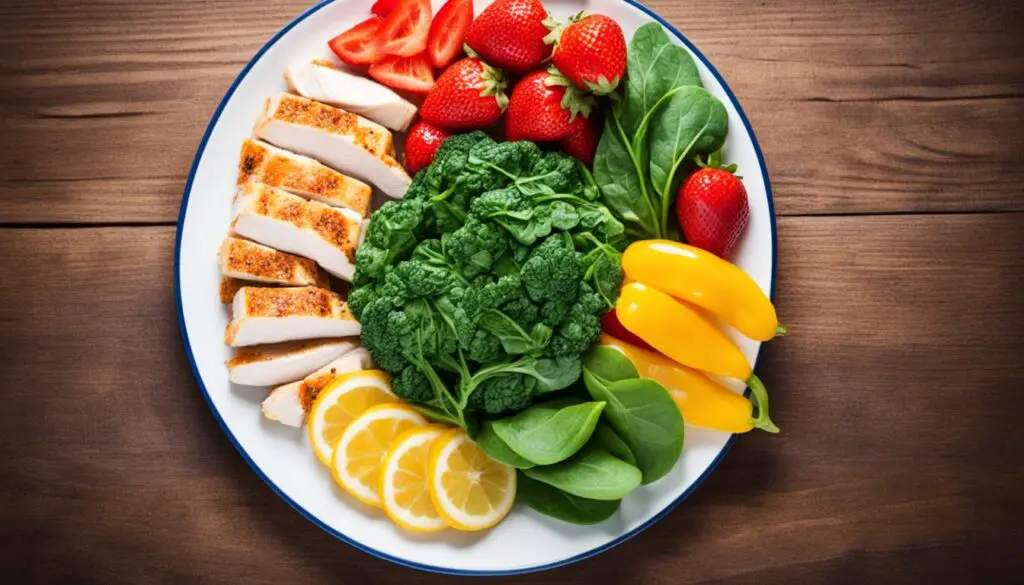
When following the HCG Diet, it is important to be mindful of your food choices. The diet restricts certain foods while allowing others, creating a specific meal plan to promote optimal weight loss. Here’s a closer look at what foods to eat and what foods to avoid during the HCG Diet:
Allowed Foods:
- Lean Proteins: Such as chicken breast, turkey, white fish, shrimp, and lean cuts of beef.
- Low-Carbohydrate Vegetables: Including spinach, lettuce, cucumbers, tomatoes, asparagus, and broccoli.
- Limited Fruits: Such as apples, strawberries, oranges, and grapefruits.
- Specific Seasonings: Utilize herbs, spices, and vinegar to add flavor to your meals.
Restricted Foods:
- Sugary Desserts: Avoid foods like cakes, cookies, candies, and ice cream.
- Dairy Products: Including milk, cheese, and yogurt.
- Grains: Eliminate bread, pasta, rice, and cereals from your diet.
- Oils: Avoid cooking oils and oil-based dressings.
- Alcoholic Beverages: All alcoholic drinks are off-limits during the diet.
In addition to these restrictions, it is important to be cautious with coffee, tea, and water consumption. While they are allowed on the HCG Diet, sweeteners and milk should be limited or avoided altogether. It is essential to carefully read labels and choose products that align with the diet’s guidelines.
The HCG Diet meal plan typically consists of two meals per day, with each meal carefully designed to adhere to the specific calorie limit of the diet. This ensures that you are consuming the necessary nutrients while promoting weight loss.
By following the approved food choices and meal plan, you can optimize your chances of success with the HCG Diet and achieve your weight loss goals.
Safety and Effectiveness of the HCG Diet
The safety and effectiveness of the HCG Diet have been a subject of intense debate among experts. It’s important to note that the U.S. Food and Drug Administration (FDA) does not approve the use of HCG for weight loss purposes. Numerous studies have also failed to show any significant difference in weight loss between individuals using HCG and those given a placebo.
One of the main concerns surrounding the HCG Diet is its extreme calorie restriction. The diet typically limits daily caloric intake to just 500 calories, which is far below the recommended daily intake for most individuals. This severe restriction can lead to nutrient deficiencies, potentially causing health complications and negatively impacting overall well-being.
Furthermore, the HCG Diet’s restrictive nature raises concerns about the development of disordered eating patterns. The very low-calorie intake, coupled with the exclusion of entire food groups, can promote obsessive thoughts about food and a distorted relationship with eating. This can have long-term psychological and emotional consequences.
The HCG Diet’s extreme calorie restriction and lack of scientific evidence raise questions about its safety and effectiveness as a weight loss strategy.
The potential side effects of the HCG Diet should also be considered. Some individuals may experience adverse effects such as fatigue, irritability, headaches, and hair loss. Moreover, injections of HCG hormone may cause pain, bruising, or infection at the injection sites.
Given these concerns and the lack of substantial evidence supporting its efficacy, it is advisable to approach the HCG Diet with caution and seek guidance from a healthcare professional or registered dietitian before starting any weight loss program.
Alternatives to the HCG Diet
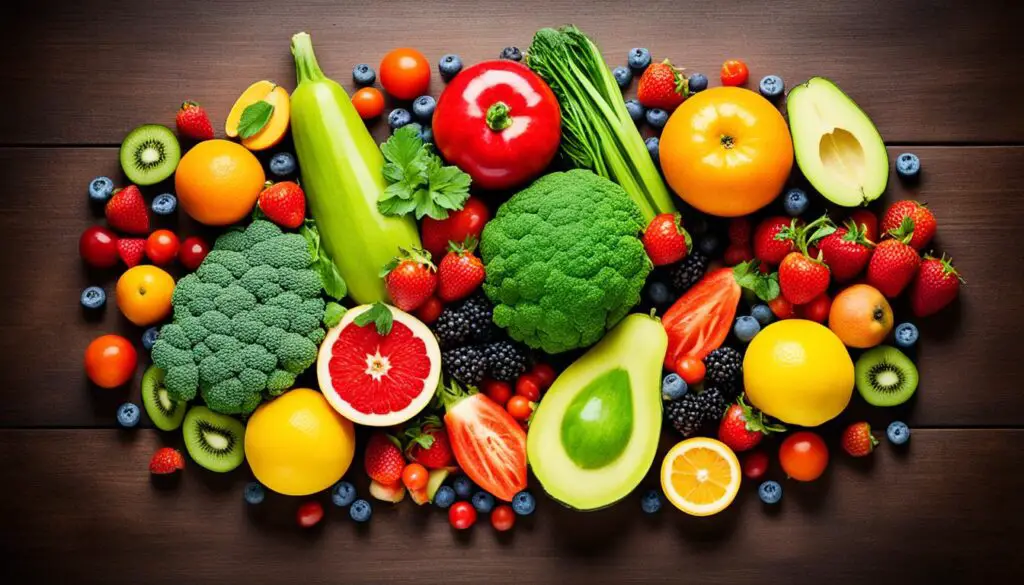
Instead of the HCG Diet, there are numerous safe and effective alternatives available for weight loss. Health experts emphasize the importance of adopting balanced and sustainable meal plans that incorporate a diverse range of nutritious foods. Achieving weight loss goals can be accomplished through strategies such as portion control, regular physical activity, and seeking guidance from healthcare professionals or registered dietitians.
When it comes to weight loss, it’s essential to prioritize long-term health and well-being. Sustainable diets that promote gradual and consistent weight loss are considered more beneficial than extreme and restrictive approaches. By implementing healthy eating habits and making lifestyle changes, individuals can achieve sustainable weight loss while maintaining overall health.
Evidence-Based Safe Weight Loss Methods
- Create a calorie deficit through portion control and mindful eating
- Incorporate a variety of whole foods, including fruits, vegetables, lean proteins, and whole grains
- Engage in regular physical activity to enhance calorie burning and promote overall fitness
- Utilize behavioral strategies like food diary tracking or seeking support from weight loss programs
By focusing on long-term lifestyle changes and adopting a well-rounded approach to weight loss, individuals can achieve sustainable results and improve overall health.
It’s important to remember that weight loss is a highly individualized journey, and what works for one person may not work for another. Consulting with a healthcare professional or registered dietitian can provide personalized guidance and support in developing a safe and effective weight loss plan tailored to individual needs and preferences.
Remember, the key to successful weight loss lies in making gradual, sustainable changes to eating habits and lifestyle. This approach not only promotes healthy weight loss but also ensures long-term weight maintenance and overall well-being.
HCG Diet Alternatives Comparison
| Aspect | HCG Diet | Safe Weight Loss Methods |
|---|---|---|
| Sustainability | Highly restrictive and challenging to maintain long-term | Emphasizes gradual changes and sustainable habits |
| Dietary Variety | Limited food choices and exclusion of major food groups | Encourages a diverse range of nutritious foods |
| Overall Health | Debate surrounding safety and potential risks | Promotes overall health and well-being |
| Professional Guidance | Minimal guidance provided | Support from healthcare professionals or registered dietitians |
As shown in the table above, safe weight loss methods outperform the HCG Diet in terms of sustainability, dietary variety, overall health benefits, and the availability of professional guidance. Choosing a safe and sustainable approach to weight loss ensures that individuals can achieve their goals while prioritizing their long-term health and well-being.
Potential Risks and Side Effects of the HCG Diet
The HCG Diet, despite its promises of rapid weight loss, comes with potential risks and side effects. It is crucial to consider these before embarking on the diet. Some of the risks and side effects associated with the HCG Diet are:
- Nutrient Deficiencies: The severe calorie restriction of the HCG Diet can lead to nutrient deficiencies, as the diet limits the intake of various food groups. This can result in inadequate intake of essential vitamins, minerals, and other nutrients necessary for optimal health.
- Fatigue: Due to the extremely low-calorie intake, individuals on the HCG Diet may experience fatigue and low energy levels. This can make it challenging to engage in daily activities and exercise routines.
- Irritability and Depression: The drastic reduction in calorie intake can also impact mood and mental well-being. Some individuals may experience increased irritability, mood swings, and even symptoms of depression.
- Hair Loss: In some cases, individuals following the HCG Diet may experience hair loss. This can be a distressing side effect and may take time to resolve even after discontinuing the diet.
- Weight Regain: Once the HCG Diet is completed, there is a risk of weight regain. This is primarily due to the extreme calorie restriction, which can slow down the metabolism and make it harder to maintain the weight loss achieved during the diet.
- Disordered Eating Behaviors: Severe calorie restriction and strict food rules of the HCG Diet can contribute to the development of disordered eating behaviors, such as binge eating or rigid food restrictions and obsessions.
- HCG Injections: Injections of the HCG hormone may cause pain, bruising, and infection at the injection sites. It is essential to follow proper injection techniques and consult a healthcare professional to minimize the risk of complications.
These risks and side effects highlight the potential dangers associated with the HCG Diet. It is crucial to prioritize overall health and well-being when considering weight loss methods, opting for safe and sustainable alternatives instead.
“The HCG Diet may promise rapid weight loss, but its potential risks and side effects should not be overlooked. Severe calorie restriction can lead to nutrient deficiencies, fatigue, hair loss, and even disordered eating behaviors. It is essential to prioritize long-term health and well-being when embarking on any weight loss journey.”
The Legality of the HCG Diet
When it comes to the legality of the HCG Diet, it’s important to understand the restrictions and regulations surrounding this weight-loss protocol. HCG injections and supplements are only legally prescribed for the treatment of female infertility. This means that using HCG for weight loss purposes without a prescription is not only ineffective but also illegal.
Over-the-counter HCG products that claim to aid in weight loss are illegal in the United States. In fact, the Food and Drug Administration (FDA) has issued warnings about the safety and fraudulent claims associated with these products. It’s important to be cautious and aware of misleading advertising when considering over-the-counter HCG supplements.
While some may argue that they’ve found success with HCG Diet over-the-counter supplements, the truth is that they are not regulated or approved for weight loss. The potential risks and lack of scientific evidence make it a risky venture.
“Using HCG for weight loss purposes without a prescription is not only ineffective but also illegal.”
To ensure your safety and well-being, it’s always best to consult with a healthcare professional or registered dietitian before starting any weight loss plan. They can provide guidance based on your individual needs and recommend safe and sustainable alternatives to the HCG Diet.
| HCG Diet Legality | Prescription | Over-the-Counter |
|---|---|---|
| Legal for the treatment of female infertility | Required | Illegal |
| Approval | Yes | No |
| FDA Regulation | Yes | No |
| Weight Loss Claims | No scientific evidence | Fraudulent |
The Cost of the HCG Diet
The cost of the HCG Diet can vary depending on several factors. One of the main expenses is the required hormonal injections or supplements. These injections can be quite expensive, especially if they need to be purchased regularly throughout the duration of the diet. It’s important to consider this cost when deciding to start the HCG Diet.
Additionally, the diet’s restrictions may lead to additional costs. The HCG Diet requires specific food choices, which may include lean proteins, low-carbohydrate vegetables, and limited fruits. These food choices can sometimes be more expensive compared to a regular diet that includes a wider variety of food groups.
Furthermore, supplements may also be recommended to support the body’s nutritional needs during the diet. These supplements, such as vitamins and minerals, can add an extra financial burden. It’s essential to factor in the cost of these supplements to ensure proper nutrient intake while on the HCG Diet.
Considering the cost of the HCG Diet, it’s crucial to take into account the long-term financial commitment. The diet’s protocol often requires a strict adherence for several weeks or months, which means the expenses can accumulate over time. Moreover, it’s important to weigh the cost against potential risks and side effects associated with the HCG Diet.
Is the HCG Diet Cost Worth It?
When deciding whether the cost of the HCG Diet is worth it, it’s essential to consider both the financial and health aspects. While some individuals may be able to afford the expenses, the effectiveness and safety of the HCG Diet are highly debated.
“The HCG Diet can potentially be an expensive endeavor, especially with the injection costs and restrictive food choices. However, given the lack of scientific evidence supporting its effectiveness and the potential risks involved, it may not be the best investment for achieving long-term weight loss.” – Dr. Sarah Johnson, Registered Dietitian
Before investing in the HCG Diet, it’s recommended to explore alternative weight loss methods that are safe, sustainable, and potentially more cost-effective. Working with a healthcare professional or registered dietitian can provide personalized guidance on creating a healthy meal plan and achieving weight loss goals without the high costs and risks associated with the HCG Diet.
| Expense | Average Cost |
|---|---|
| HCG Injections | $100-$300 per month |
| Specific Food Choices | Varies depending on individual preferences and local market prices |
| Nutritional Supplements | $20-$50 per month |
Hunger and Adverse Effects of the HCG Diet
The severe calorie restriction of the HCG Diet can have significant impacts on individuals, including intense hunger and a range of adverse effects. One of the most common complaints from participants is the feeling of constant hunger, as the diet restricts caloric intake to an extremely low level. This can result in feelings of deprivation, irritability, and difficulty maintaining the diet.
In addition to hunger, the HCG Diet can also lead to various adverse effects on the body. Many participants report experiencing frequent headaches, which can be attributed to the low-calorie and low-carbohydrate nature of the diet. These headaches can be debilitating and affect daily functioning.
Furthermore, the severe calorie restriction can also result in fatigue and decreased energy levels. Participants may feel tired, sluggish, and experience difficulties in performing regular activities. This can impact overall quality of life and limit productivity.
Other adverse effects of the HCG Diet include brain fog and dizziness. The lack of essential nutrients and energy from the restricted diet can affect cognitive function, leading to difficulties in concentration and mental clarity. Dizziness can also occur due to low blood sugar levels and inadequate fuel for the body’s needs.
It is important to note that low-calorie diets such as the HCG Diet are not sustainable in the long term. While rapid weight loss may occur initially, the body’s response to prolonged calorie restriction is to slow down metabolism and conserve energy, making weight regain likely once normal eating is resumed. This cyclical pattern of weight loss and regain can be frustrating and detrimental to overall health.
Before embarking on any diet plan, including the HCG Diet, it is crucial to consider the potential for hunger and adverse effects. Consulting with a healthcare professional or registered dietitian can provide valuable guidance and ensure that weight loss efforts are safe, effective, and sustainable.
Nutrient Deficiencies and the HCG Diet
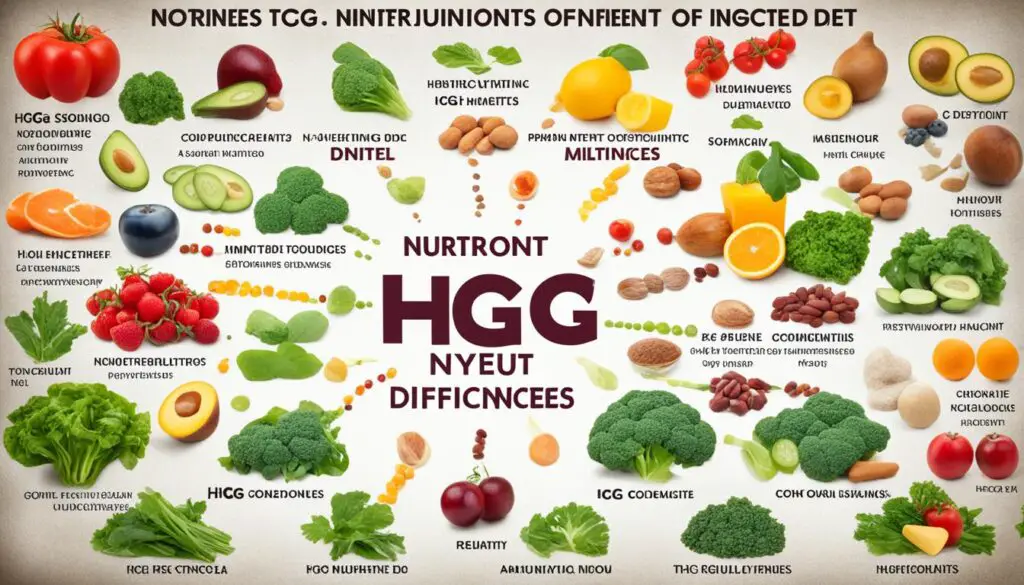
The extreme calorie restriction and limited food choices of the HCG Diet increase the risk of nutrient deficiencies. By excluding important food groups like dairy and grains, the diet deprives the body of essential nutrients like B vitamins and fiber. This raises concerns about the long-term impact on overall health and the potential for developing other diseases.
The Impact of HCG Diet on Nutrient Intake
The HCG Diet severely restricts calorie intake to only 500 calories per day during the fat burn phase. With such a low calorie limit, it becomes challenging to consume a well-rounded and balanced diet that meets all nutritional needs. As a result, deficiencies in various vitamins and minerals are likely to occur.
Vitamin and Mineral Deficiencies
Due to the limited food choices, the HCG Diet can lead to deficiencies in several key vitamins and minerals. Here are some examples:
| Nutrient | Function | Deficiency Consequences |
|---|---|---|
| Vitamin B12 | Supports red blood cell production and nerve function | Anemia, fatigue, neurological problems |
| Vitamin D | Aids in calcium absorption for bone health | Weak bones, increased risk of fractures |
| Calcium | Essential for bone and teeth health, nerve function, and blood clotting | Osteoporosis, muscle cramps, brittle nails |
| Fiber | Promotes healthy digestion and bowel movements | Constipation, digestive issues |
The Importance of a Balanced Diet
A well-rounded and balanced diet is crucial for optimal health and wellbeing. It provides the body with the necessary nutrients to support bodily functions, immune system strength, and overall vitality. By severely restricting food choices, the HCG Diet puts individuals at risk of not obtaining essential vitamins, minerals, and other nutrients needed for overall health.
The Role of a Healthcare Professional
Before embarking on any restrictive diet plan like the HCG Diet, it is essential to consult with a healthcare professional or a registered dietitian. They can assess your unique nutritional needs, guide you on sustainable weight loss strategies, and help prevent deficiencies associated with diets like the HCG Diet. A professional can also offer alternatives that prioritize balanced nutrition and long-term health.
Disclaimer: The information provided in this article is for informational purposes only and should not be considered as medical or professional advice. Always consult with a healthcare professional before starting any diet or weight loss program.
Conclusion
The HCG Diet is a controversial and potentially unsafe weight loss plan. It involves extreme calorie restriction and the use of HCG hormone supplements or injections, which have not been proven effective for weight loss. While proponents of the HCG Diet claim rapid weight loss without hunger or muscle loss, there is no scientific evidence to support these claims.
Health experts strongly discourage individuals from trying the HCG Diet and instead recommend safe and sustainable alternatives for achieving weight loss goals. These alternatives focus on balanced meal plans that include a variety of nutritious foods, portion control, regular physical activity, and support from healthcare professionals or registered dietitians.
Consulting with a healthcare professional or registered dietitian is advised for personalized guidance on weight loss strategies that prioritize overall health and well-being. It is important to prioritize long-term sustainable approaches to weight loss rather than relying on restrictive diets that may have potential health risks and adverse effects.
FAQ
What is the HCG Diet?
The HCG Diet is a weight loss protocol that combines the use of HCG hormone supplements or injections with a very low-calorie diet.
How many calories can I consume on the HCG Diet?
During the fat burn phase of the HCG Diet, participants consume only 500 calories per day.
What are the phases of the HCG Diet?
The HCG Diet consists of three phases: the start phase, fat burn phase, and maintenance phase.
Which foods are allowed on the HCG Diet?
The HCG Diet allows for lean proteins, certain low-carbohydrate vegetables, limited fruits, and specific seasonings.
Are there any side effects or risks associated with the HCG Diet?
Yes, the HCG Diet can pose potential risks and side effects, including nutrient deficiencies, fatigue, irritability, depression, and hair loss.
Is the HCG Diet safe and effective?
The safety and effectiveness of the HCG Diet are highly debated among experts, and the FDA does not approve the use of HCG for weight loss.
Are there alternatives to the HCG Diet for weight loss?
Yes, there are many safe and effective alternatives for weight loss, including balanced and sustainable meal plans.
Is the HCG Diet legal?
HCG injections and supplements are only legally prescribed for the treatment of female infertility, and over-the-counter HCG products for weight loss are illegal.
How much does the HCG Diet cost?
The cost of the HCG Diet can vary, but the required hormonal injections are not cheap, and there may be additional costs for specific food choices and supplements.
Does the HCG Diet cause hunger and adverse effects?
Yes, the severe calorie restriction of the HCG Diet can lead to intense hunger and a range of adverse effects, including headaches, brain fog, fatigue, and dizziness.
Can the HCG Diet lead to nutrient deficiencies?
Yes, the extreme calorie restriction and limited food choices of the HCG Diet increase the risk of nutrient deficiencies, as important food groups like dairy and grains are excluded.
What are the final thoughts on the HCG Diet?
The HCG Diet is a controversial and potentially unsafe weight loss plan, and health experts discourage individuals from trying it. There are safer and more sustainable alternatives for achieving weight loss goals.

